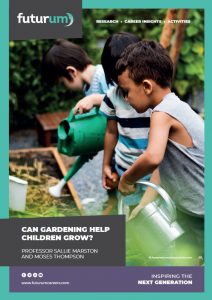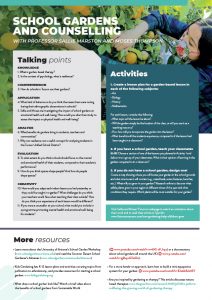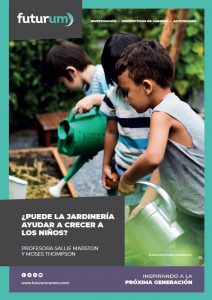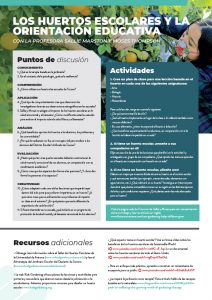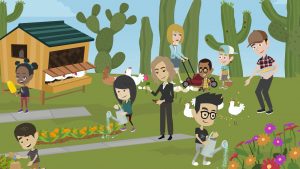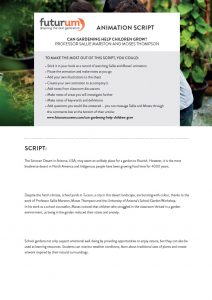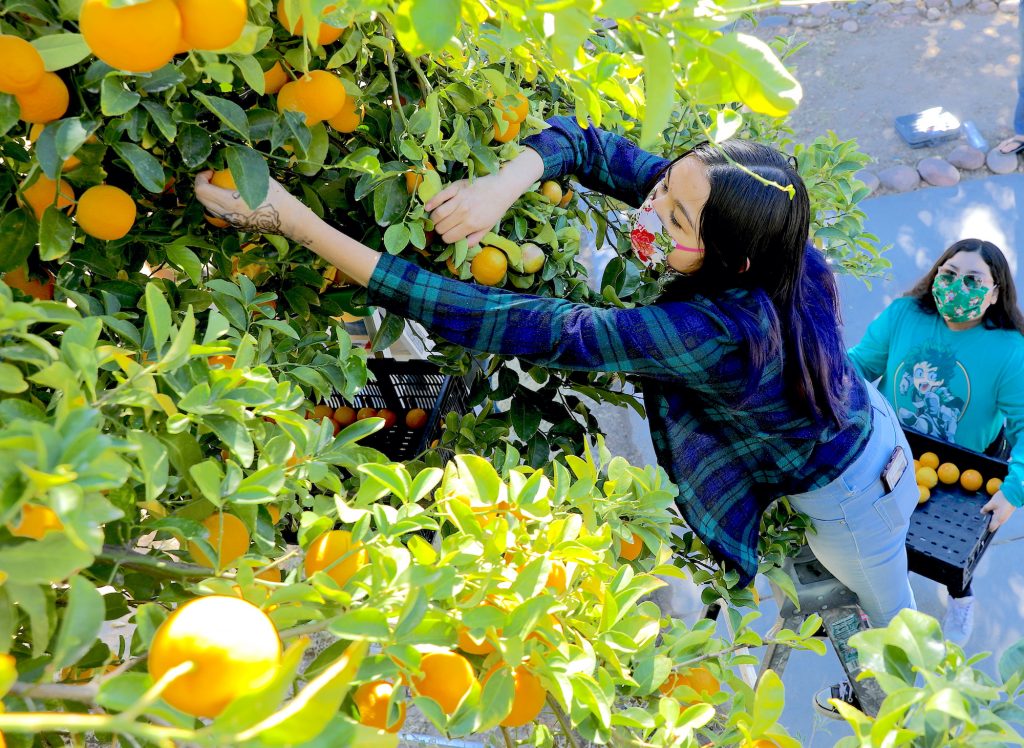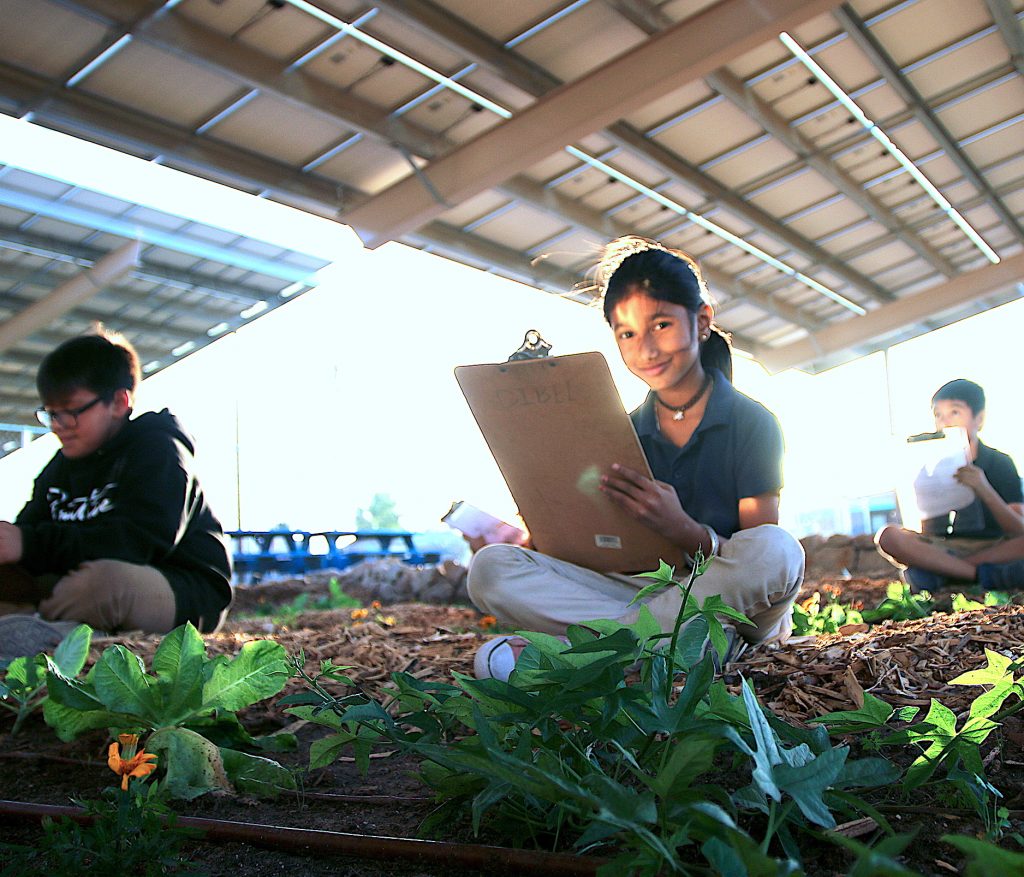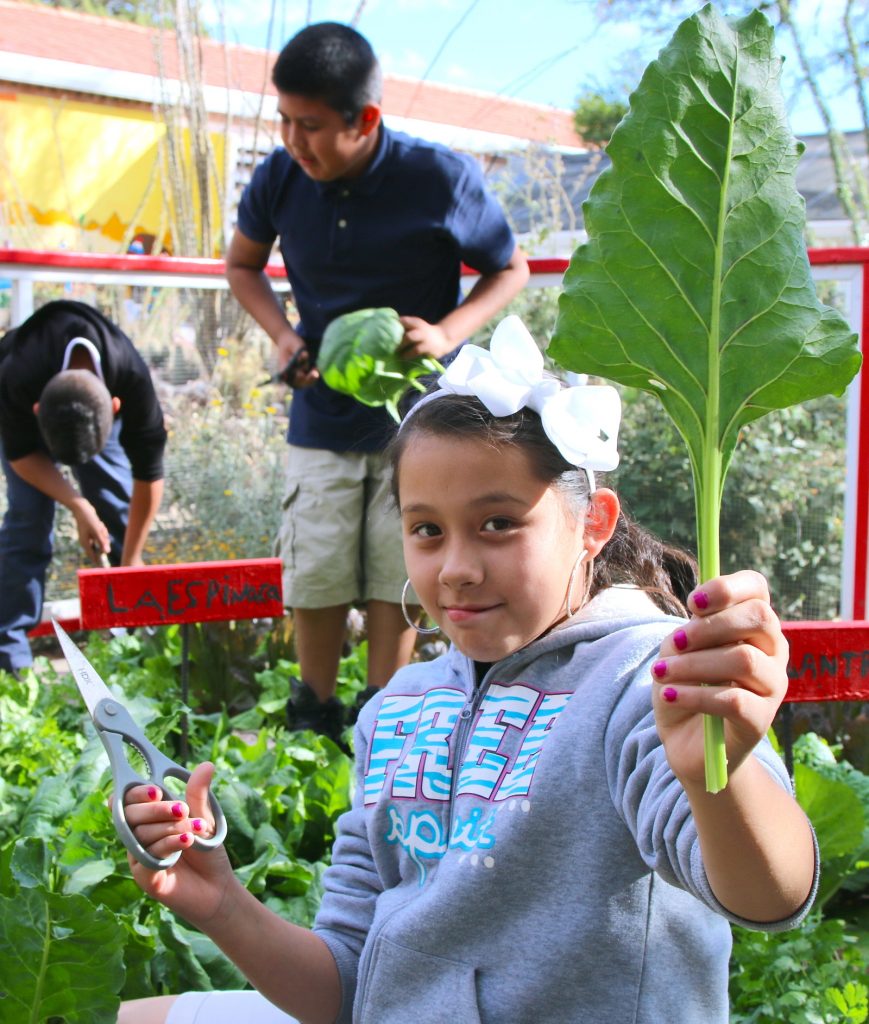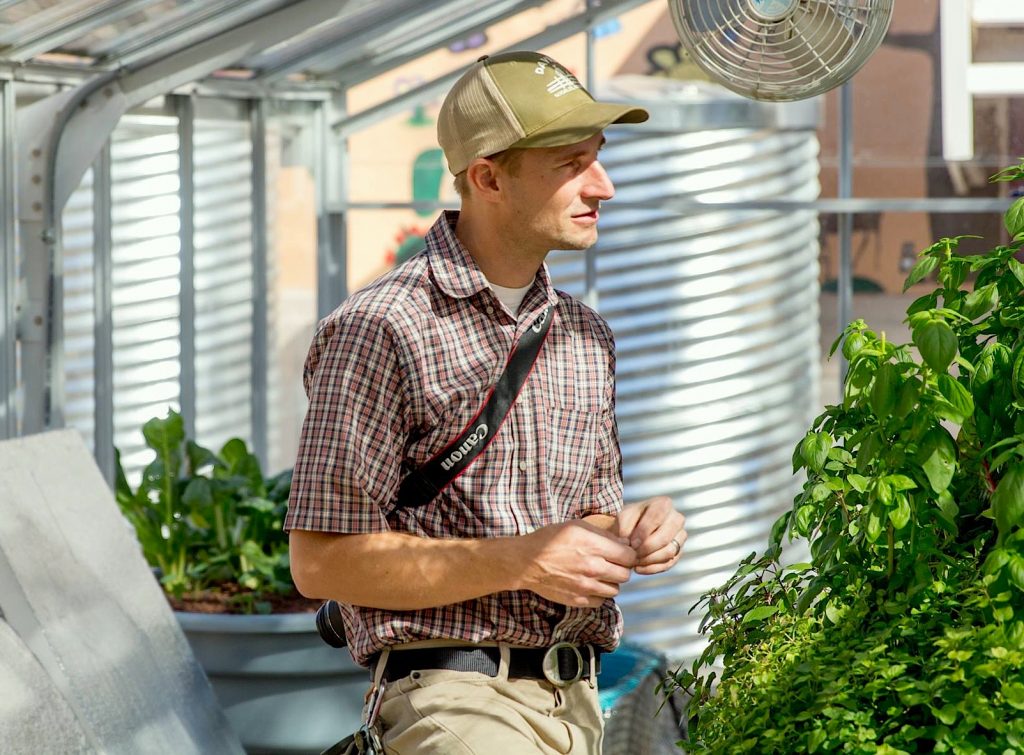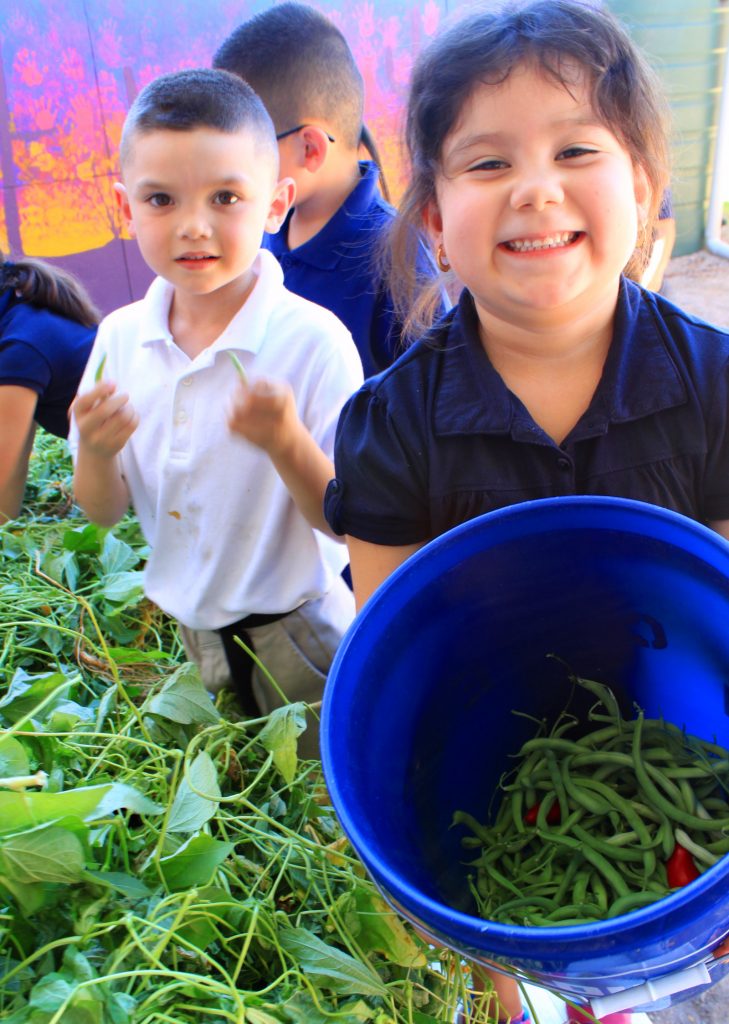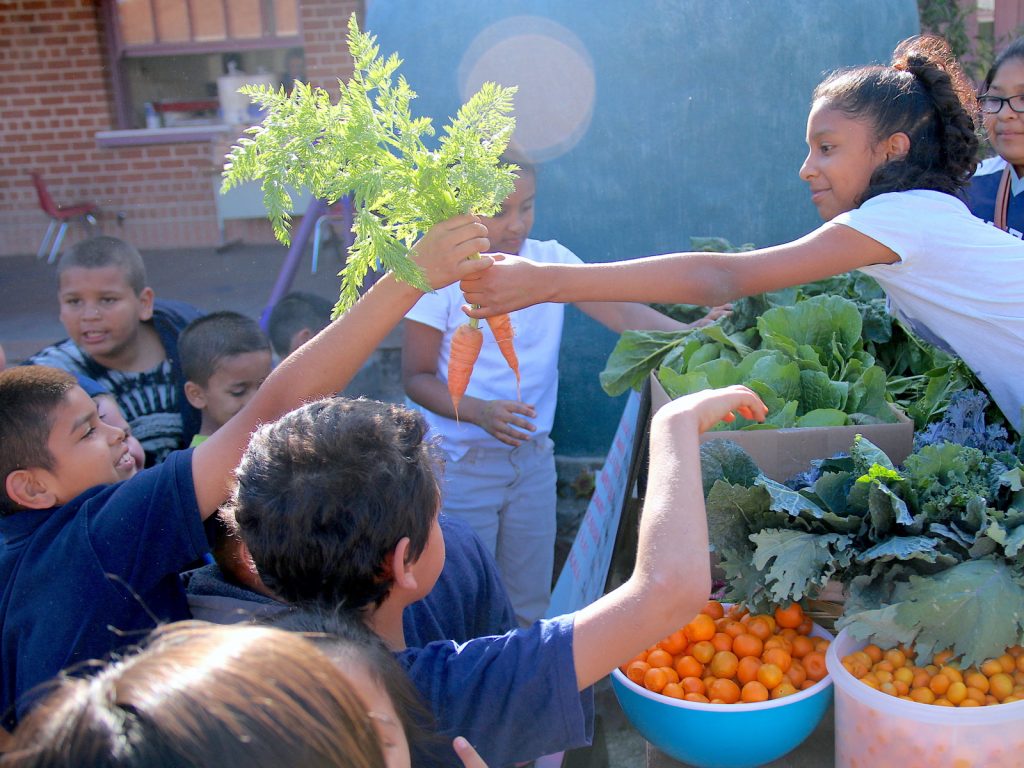Can gardening help children grow?
Founded by Professor Sallie Marston and led by former school counsellor Moses Thompson, the University of Arizona’s School Garden Workshop creates and maintains gardens for schools in Tucson. Not only do gardens provide sites for practical learning, but Sallie and Moses believe they help children improve their social competencies and emotional well-being.
Talk like a school counsellor and gardener
Aquaponic — a system of jointly farming fish and plants, in which water and nutrients are cycled between the fish and plants
Emotion regulation — the ability to control your emotions
Ethnographic observation — an anthropology research method in which the researcher observes humans in their cultural setting
Raised bed — a gardening technique in which soil is raised above the ground-level, usually enclosed in a large container
Resilience — the ability to bounce back to a pre-crisis state after experiencing severe stress. It includes capacities such as adaptability and persistence
Title I school — in the US, a designation for schools where most students come from households at or below the federal poverty level
The Sonoran Desert in Arizona, USA, may seem an unlikely place for a garden to flourish. However, it is the most biodiverse desert in North America and Indigenous peoples have been growing food here for 4000 years. Despite the harsh climate, school yards in Tucson, a city in this desert landscape, are bursting with colour. Flowers bloom, vegetables grow and children experience the wonders of nature in over 70 school gardens in the district, thanks to the work of Professor Sallie Marston, Moses Thompson and the University of Arizona’s School Garden Workshop.
Why do school gardens matter?
Garden-based therapy, the use of gardening activities as a treatment for mental and physical ailments, is a well-established tool for lowering stress levels and encouraging physical exercise. In his work as a school counsellor, Moses used garden-based therapy to help children with adverse childhood experiences. “I noticed that working in the garden reduced children’s anxiety, fear and anger,” he says. “Most importantly, through working in the garden, students came to understand how to manage these emotions.”
Garden-based learning, in which educators use gardening as an instructional tool, engages students in practical, outdoor, hands-on projects, in contrast to the theoretical, indoor nature of much conventional teaching. For example, students can conduct scientific experiments to explore how plants grow under different conditions. The gardens themselves can be used as outdoor classrooms where students can monitor weather conditions, learn about traditional uses of different species and create artwork inspired by their natural surroundings. “School gardens are places of wonder,” says Moses. “When students are curious, the motivation to learn is intrinsic, so the learning is deeper and more sustained.”
Tucson, Arizona
In Tucson, around one in four children live below the federal poverty line. All schools participating in the School Garden Workshop are Title I schools, meaning that most students come from households in poverty. Typically, Title I schools are also more racially diverse than other schools. “Title I schools in the Tucson Unified School District (TUSD) have a high percentage of Hispanic students,” explains Sallie. “On average, 60% of students are Hispanic, 20% are non-Hispanic White, and the remainder are Native American, Asian American and multiracial.” In this context, school gardens not only benefit individual students, but also bring disparate groups of people together and provide important community spaces for the residents of Tucson.
How are school gardens used in Tucson?
The School Garden Workshop helps create and maintain gardens in the TUSD, as well as training educators and students in how to use the gardens as learning and community resources. As every school yard and school community is different, every school garden is unique. Some have raised beds, some have greenhouses and some have aquaponic systems. The produce also varies, with different trees, flowers and vegetables grown. Some school gardens even contain chicken coops and tortoise habitats.
“Beyond being an outdoor classroom, school gardens provide opportunities to improve nutrition among students from families where incidences of Type 2 Diabetes are high,” says Sallie, as the produce grown in gardens is served in school cafeterias. “Through food literacy lessons and take-home meal kits, students can learn about healthy eating and take those lessons home to their families.”
School gardens promote problem solving and collaboration (for example, students must work together to catch escaped chickens!), and they support emotional well-being by providing opportunities for yoga or simply to enjoy the sights, sounds, smells and tastes of the garden. They also increase connections with the community, as neighbours and family members share their skills (e.g., stone masonry and construction) and knowledge (e.g., Indigenous planting calendars) with teachers and students.
Do school gardens increase resilience?
Having witnessed the benefits school gardens bring to students, teachers and communities, Sallie and Moses wanted to investigate these impacts from a scientific viewpoint. To do this, they focused on the psychological concept of resilience, and whether students in Tucson displayed greater resilience following the COVID-19 pandemic lockdowns if they attended a school with a garden. “Psychological resilience is founded on two different constructs: adversity and positive adaptation,” explains Sallie. “Children are resilient when they possess the ability and personal assets to endure the negative effects of stresses and can ‘bounce back’ to their pre-crisis status. With respect to learning, resilience is the ability to be mentally ‘present’ to learn.”
An initial key finding was that the concept of resilience was a poor fit for their study. As most of the students in the TUSD come from households in poverty, there was no true ‘pre-crisis’ state for them to return to after the lockdowns. While Sallie and Moses found evidence of self-reliance, emotion regulation and perseverance in the students, the psychological tools used to measure resilience could not adequately capture these.
Instead, Sallie, Moses and the team conducted ethnographic observations in different schools. This involved observing lessons held in classrooms and gardens over the course of seven months and taking detailed notes. “Our field notes resulted in a complex assembly of descriptive and analytical material that provided a deep and expansive foundation for understanding how gardens have been of value in what we are now calling ‘self-determination’, rather than resilience,” Sallie says.
This data analysis involves statistically comparing the well-being and self-determination of students exposed to school gardens with students attending schools without gardens. The observational notes are coded by applying a word or phrase that best describes the recorded behaviour. The codes are fine-tuned and ultimately provide a rich dynamic assessment.
Although they are still waiting to draw scientific conclusions from their research study, over their years of working with the School Garden Workshop, Sallie and Moses have observed first-hand how school gardens are helping not only flowers, but also children, bloom in the desert.
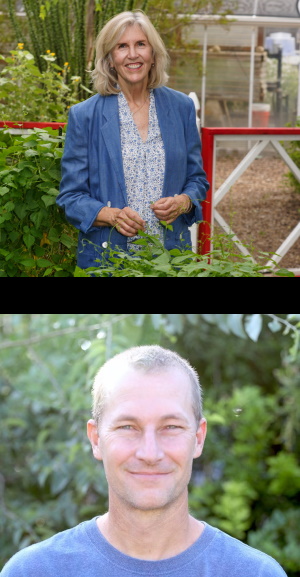 Professor Sallie Marston
Professor Sallie Marston
School of Geography, Development and Environment, University of Arizona, USA
Founder, School Garden Workshop
Field of research: Human Geography
Moses Thompson
Director, School Garden Workshop
Research project: Investigating school gardens as sites of psychological resilience
Funder: US National Science Foundation (NSF), NSF Award Number (FAIN): 2146751
About school gardens and counselling
“School gardens are the perfect vehicle for bringing classroom learning out into the real world,” says Moses. School gardens are a practical way to learn about agriculture and horticulture, allowing students to experience how plants grow and to gain a sense of self-reliance from growing their own food. Gardening can be an opportunity to learn about Indigenous medicine and cuisine, planting calendars and traditional growing practices that connect students with their heritage and community. Gardens also help students develop academic skills, as applying a scientific and mathematical approach to gardening will result in improved outcomes, and linking theoretical ideas learnt in the classroom with hands-on work in the garden helps students connect abstract knowledge to their day-to-day life.
School gardens have a positive impact on student learning, health and emotional well-being. Spending time outdoors engaged in physical activity, working with peers or members of the wider community, and nurturing plants and animals all lower stress and create a feeling of connectedness. And gardens do not just help students – teachers also report that they find the gardens therapeutic.
Reference
https://doi.org/10.33424/FUTURUM356
Fifth graders running a school farmer’s market
(All images © Moses Thompson)
What does it take to create a school garden?
“Teachers and students who wish to create a school garden must be realistic about the time and energy needed to make gardens flourish and be useful as learning spaces,” advises Sallie. “Once a garden is launched, it needs to be maintained through watering, weeding, harvesting and renewing.” It is important to consult seasonal calendars so you know what plants to grow when, and to decide how the garden will be maintained during school holidays. “The good news is that gardens will more than repay all the effort that is invested in them!” says Sallie. “This is not just with nutritious produce, but with engaging learning opportunities, social and emotional growth, and the cultivation of a landscape that supports the local ecology.”
Pathway from school to school counselling
• At school, take advantage of any available education and psychology classes.
• At university, study education, psychology, counselling or a related degree.
• Requirements for working in education or with children vary by country and state. In the US, school counsellors are typically required to have a master’s degree in counselling or educational psychology.
• “Consider classroom teaching as a foundation for a career in school counselling or school psychology,” says Moses. Gain experience of working in a classroom to become familiar with the culture of schools and the needs of students.
Explore careers in school counselling
• The role of a school counsellor is to ensure the well-being of all students. This may involve supporting the academic and emotional development of individuals, as well as mediating in conflicts students have with others in the school.
• Positive Psychology has an informative article detailing the main roles and goals of a school counsellor: positivepsychology.com/what-is-school-counselor-role
• In the US, school counsellors are represented by the American School Counselor Association, which offers information about the profession, as well as training and development opportunities: www.schoolcounselor.org
Meet Sallie
What motivated your interest in human geography?
As a teenager, I was interested in psychology and what influences people to do what they do and be who they are. At university, I studied psychology and geography, because geographers aim to understand how where you are shapes who you are, and that connection was very appealing to me. These two subjects allowed me to combine geography’s focus on place and space with psychology’s focus on people. Spaces shape people; but of course, people also shape spaces.
What do you most enjoy about your work?
I enjoy turning the geography-psychology lens onto the relationship between people and environments in different situations. The work I am currently doing with school gardens is the most rewarding I have ever done. It draws from my research interests in place and society and engages me with interesting young people and exciting research questions about the power of transformative education.
Why should people spend time in gardens?
I enjoy gardens as spaces of respite from the challenges of my everyday life. They provide an opportunity to tune out stresses and focus on the marvels of nature. It is exciting to watch things grow and feel a sense of accomplishment in helping make that happen. School gardens are places where important research on climate change is occurring, forgotten relationships with local and Indigenous knowledge are being rekindled and challenges about food security and social justice are being met. I’d recommend spending some time in a garden making things grow. It’s exhilarating!
Sallie’s top tips
If you are interested in connecting geography and psychology:
1. Get to know each discipline, so you can appreciate their unique contributions to science and daily life.
2. Consider your strengths, interests and what you could bring to this exciting relationship.
Meet Moses
What did you most enjoy about your work as a school counsellor?
I enjoyed connecting with kids and families and having the opportunity to create moments of joy for students. So many kids come to school with the emotional weight of things that happen outside school that are beyond their control. It is a very special thing to be someone who listens, helps kids make sense of their feelings, helps them see a path forward, and who brings them joy in the middle of a stressful school day.
What have been the highlights of the School Gardens project?
Where do I start?! The early years, when I was gardening with kids and families as a school counsellor, were the golden years. We were learning to garden together and transforming the school yards. Students who struggled in the classroom would thrive in the gardens. Parents would work with us and talk about how gardening reminded them of growing up.
A second highlight would be right now, as I’m surrounded by an amazing team in this successful programme. We’re working on our third school garden almanac, a place-based gardening handbook of local knowledge. It’s emblematic of all the good things school gardens are capable of, and it’s going to be the best almanac yet!
Why do you enjoy gardening?
Every day, when I drop my 7-year-old off at school, I spend 20 minutes in his school garden which sets my trajectory for the day. A lot of things happen when I do gardening – I take my mind off stressful things and connect and with people and nature. It’s centring, and I enjoy seeing spaces transformed.
Moses’ top tips
If you would like to work professionally in school gardens:
1. Build foundational knowledge of human development and education by spending time in classrooms to learn the culture of school buildings.
2. Study education, teaching or school counselling, with a focus on social and emotional learning in gardens.
Do you have a question for Sallie and Moses?
Write it in the comments box below and Sallie and Moses will get back to you. (Remember, researchers are very busy people, so you may have to wait a few days.)

